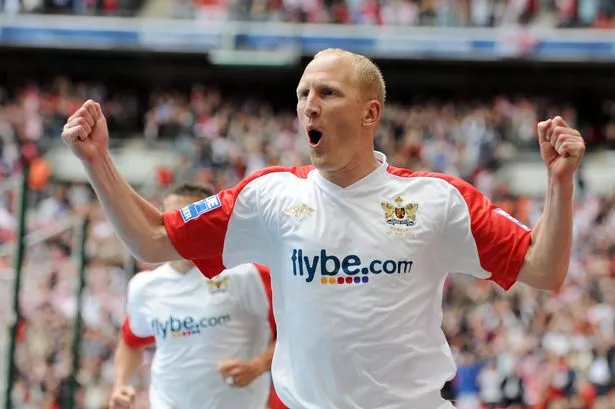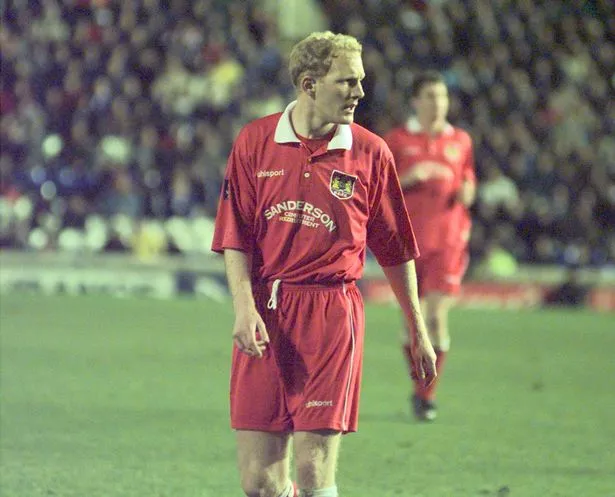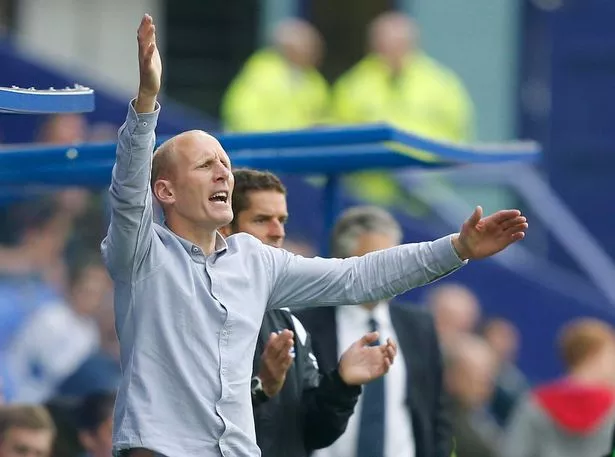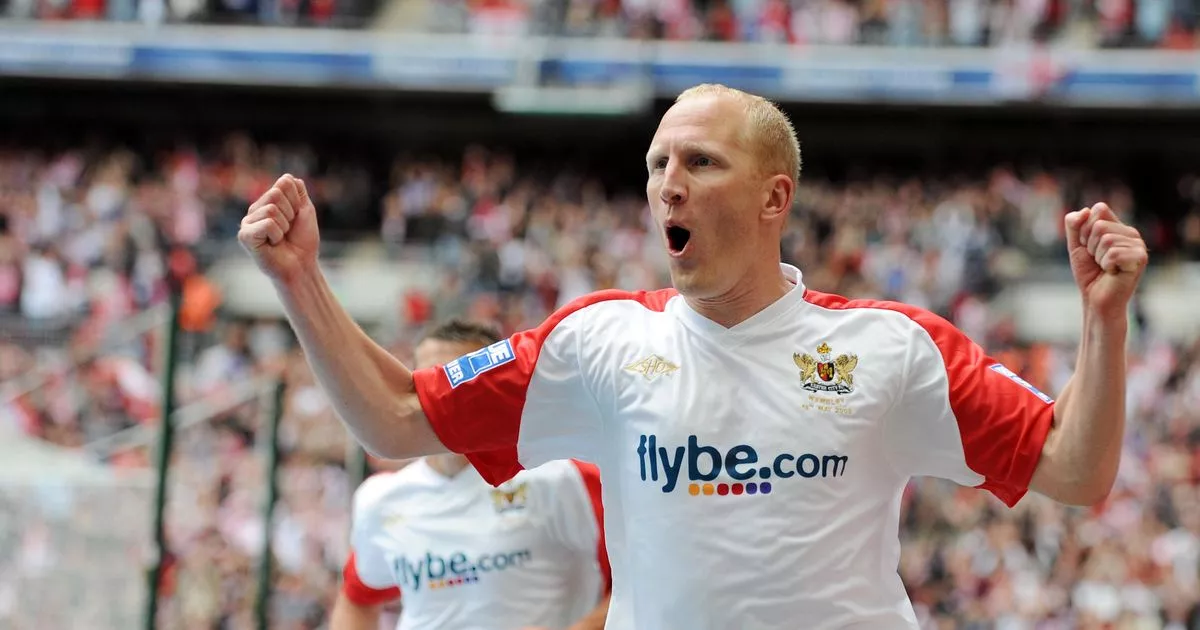Rob Edwards’ journey has taken him from teenage prodigy at Carlisle United, to stints at Bristol City, Preston and Exeter and now to helping Cheltenham Town climb League Two, all shaped by the early guidance of legendary ex-Manchester United goalkeeper Harry Gregg
17:09, 31 Oct 2025Updated 17:13, 31 Oct 2025
 Rob Edwards celebrates his Wembley winner for Exeter City against Cambridge United in the 2008 National League play-off final (Image: Phil Mingo/Pinnacle)
Rob Edwards celebrates his Wembley winner for Exeter City against Cambridge United in the 2008 National League play-off final (Image: Phil Mingo/Pinnacle)
When Rob Edwards joined Carlisle United at the age of 14, first team manager Harry Gregg assured him that he would make it.
The legendary ex-Manchester United goalkeeper also said: “You’re not a particularly good mover, but you are a lovely passer of the ball,” which Edwards admits summed him up perfectly.
Just as Gregg had predicted, Edwards broke through at Carlisle as a teenager and was soon attracting interest. “I was lucky because one of my friends was the son of John McNamee, who had played for Celtic and Newcastle, so I had really good coaching from the age of 10,” Edwards says. “I joined Carlisle straight after my GCSEs and played more than 50 games, with some good older pros around me, which helped.”
Clive Middlemass had succeeded Gregg as the Cumbrians’ boss by this point and despite strong interest from Brian Clough’s Nottingham Forest, he ended up joining Bristol City for £135,000 in March 1991.
“Forest actually put me in digs with Sean Dyche, Steve Stone and Ian Woan, with Roy Keane moving in over the road,” Edwards recalls. “If I’d gone there, my career might have been very different, but Carlisle wanted too much for me. Clive had worked as Terry Cooper’s assistant at Bristol City, so there was that link and I ended up going there just before the transfer deadline. The fee helped save Carlisle and pay their wages as they had no money at the time.”
It meant relocating from Cockermouth, where Edwards had grown up, nearly 300 miles away and Edwards featured in what is now the Championship at the age of 18. “I was fearless and had so much positivity around me at Carlisle, I thought I could handle it, but reality struck and there were a lot of things I needed to do better, but I gradually learned to be a proper footballer.” Edwards enjoyed a promotion from the third tier under John Ward’s management in 1997/98.
 Rob Edwards in action for Bristol City, where he spent eight years
Rob Edwards in action for Bristol City, where he spent eight years
He was also reunited with Dyche and the two became good friends, with the likes of Andy Cole, Shaun Goater and Jacki Dziekanowski among the attacking talents to stand out during his eight-year spell at Ashton Gate. Edwards’ form earned him a call-up for Bobby Gould’s Wales and he won a total of four caps, qualifying through his father, who hails from near Wrexham.
He faced a Hakan Şükür-inspired Turkey, started a World Cup qualifier against Belgium and appeared in friendlies against Malta and Tunisia. “We had a sprinkling of stars like Gary Speed and Ryan Giggs, but it was just before everything became a lot more professional and it wasn’t quite an elite environment at the time. My international career was short, but it was amazing and I had some pretty good left-footed players in front of me.”
Edwards was a midfielder coming through the ranks at Carlisle, but broke into the senior side at left-back. Bristol City saw him as a midfielder under boss Jimmy Lumsden, but his successor Denis Smith used him as a centre-half and Joe Jordan preferred him at left-back before Ward moved him back into midfield. “Every team played 4-4-2 then and it was about scrapping for everything, so midfield was probably my position, but being able to play in several roles helped keep me in the team.”
Ward was replaced by Benny Lennartsson, before Tony Pulis took over in the summer of 1999. “Tony offered me a three-year deal with a testimonial, but I’d decided to leave,” Edwards recalls. “I had a decent season in the Championship and I thought I’d have a few options, even though I’d had a few injuries. I got a really good offer from Grimsby Town, who were also in the Championship at the time, but I didn’t want to go there.
“I spoke to the Bristol City chairman and said I’d stay if they gave me what Grimsby had offered. His reply was ‘If I was you, I’d go to Grimsby!’ so I was literally driving up there when David Moyes phoned me.” Middlemass was now chief scout at Preston North End, where Moyes’ managerial career was just starting to gather pace. “Bolton also phoned, but I thought I’d play more at Preston, who were in the third tier. Within a year we’d gone up to the Championship anyway and Moyes was incredible.
“Some of his traits remind me of the gaffer (Steve Cotterill) here at Cheltenham now in terms of driving you and getting the most out of you and when it ended you realised how good he was for you. It was a new era of sport science and detailed analysis and Moyesey did everything right so I ended up becoming the player I probably should have two years earlier.”
Preston’s team included the likes of Graham Alexander, who Edwards rates as his favourite teammate, Sean Gregan, Paul McKenna, David Healy, Chris Lucketti and Jon Macken, who was sold to Manchester City for £5m. “Moyes said ‘I know where I am going and if you want to come with me, we all have to work’ and we very nearly made it to the Premier League.”
Preston won the League One title with 95 points in 1999/00 before reaching the Championship play-off final 12 months later, but they were beaten 3-0 at the Millennium Stadium by Bolton Wanderers. “Bolton had a really experienced team with people like Colin Hendry, Gudni Bergsson and Dean Holden, but we were right in the game at 1-0 down, missing three or four really good chances. We just came up a little bit short, but Preston was a brilliant club, who should have made the step up during that time.”
Edwards remained at Deepdale until 2004, when he switched to Blackpool, where he spent the next two years. Swansea had offered him a three-year deal, but he was reluctant to drop to League Two. “It was a big mistake not going there and if I’d known where they were going under Kenny Jackett, I’d have made a different decision, but I ended up joining Blackpool, which was a tough time for me.”
Edwards had to drive past the turning for Preston’s training ground every morning on his way to Blackpool, which did not make the adjustment any easier. “The lads would be waving at me and flashing their headlights as they turned into the training ground and it took me ages to get my head around leaving such a great group of lads.
“Blackpool had some really good players like Richie Wellens, Keith Southern and John Murphy, but I was terrible. I played the first 12 games and then told the manager (Hendry) that my left-back days were over because the game was getting quicker.
“I lost my place, the fans didn’t take to me anyway because I’d come from Preston and I wasn’t playing well, but I am proud of how I turned it around. I think I can help young players with that now because it’s all about your mental state and I finished the season well.”
Hendry was replaced by Simon Grayson in the Bloomfield Road hotseat and Edwards played alongside Peter Clarke at centre-back, with current Manchester United director of football Jason Wilcox at left-back. “We kept the club up in difficult circumstances and Grayson promised me a new contract, but when I went into his office, I could tell by the look on his face, it wasn’t going to happen and that he wanted to go in a different direction. I was annoyed at the time, but as one thing ends, another opportunity arises.”
Edwards knew Paul Tisdale from their time together at Bristol City and after meeting him for a coffee in Bath, he agreed to join Exeter City of the National League in 2006 despite interest from Carlisle and Rochdale. “My time at Exeter gave me closure as a player and allowed me to start something new. That eight-year journey is probably the reason I am sitting here now as Cheltenham’s assistant manager.”
In Tisdale’s team at St James Park were the likes of Jamie Mackie, Danny Seabourne, Dean Moxey, George Friend, Paul Jones and Matt Gill, who remains a good friend to this day. Steve Perryman was the director of football and Edwards was a key figure in the club winning back-to-back promotions.
“I remember running out at Elland Road in front of 35,000 fans thinking ‘I didn’t expect this’ and we also beat Leeds 2-0 at home in League One. When I went there, I thought I had a year or two left at best, but I loved it and Tis was really good for me. He’s a bit wacky in his own way, but he lets older players have an influence around the place and I was able to start doing my coaching badges.”
Paul Buckle was Tisdale’s assistant, while Edwards was given a player-coach role, operating at centre-half next to Matt Taylor and forming a highly effective partnership. “I played 55 games one season, at the age of 35 and it shows how the head rules the body because I was so positive, I didn’t miss any games. I also started taking the reserves, where Scot Bennett was one of the lads coming through.”
Edwards scored the winner at Wembley as Exeter beat Cambridge United in the play-off final to earn a return to the EFL in 2008, a year after they had lost to Morecambe, with Player of the Year Edwards feeling responsible for the all-important goal that secured promotion for the Shrimps. “Once you get a group of players working together and believing, it becomes special and we had that at Exeter.”
Edwards completed his UEFA B, A and Pro Licence through the Scottish FA, heavily influenced by his old boss Moyes After continuing to build his coaching experience at Exeter, Edwards took over as manager of Tranmere Rovers in May 2014, the start of a particularly challenging period.
He was sacked after winning two of 14 games in charge and then spent a brief period as Buckle’s assistant at Cheltenham before departing in February 2015. “It was a brutal, but pretty vital period for me, in terms of understanding what coaching or management was going to be,” he says. “At Exeter it was mainly good times, but Sean Dyche helped me get the Tranmere job and the club had just dropped from League One.
“After one game, the ownership had changed and the fans didn’t really want me because I hadn’t had a top career and I had no connection with the club. I had Alex Russell as my assistant and his dad played for them, but that was about it!
“In my first league game, we were 1-0 down and drew 1-1, but it felt like we’d been relegated, in terms of the fan reaction, so I thought I could be struggling. We were 2-0 up against Cheltenham at home at half-time and ended up losing 3-2. We couldn’t defend a lead and I probably wasn’t quite ready because I hadn’t had my own team for long enough before taking that job.
 Rob Edwards during his time at Tranmere Rovers manager
Rob Edwards during his time at Tranmere Rovers manager
“I didn’t win enough and it didn’t last long. Micky Adams took over and the club ended up being relegated, so it was a difficult situation for everyone. I remember being back home in Bristol thinking that my hands had been tied slightly, but at least I’d had a go at being a manager.”
Edwards’ time at Cheltenham was similarly challenging, even though he was not in the top job. “I remember losing to Dover at home in the FA Cup and I knew Paul from Exeter, but he’d failed to make a connection with anyone at the club really, so I felt sorry for the staff in particular.
“You have to try and make people feel comfortable and allow them to enjoy their work, which is what I’ve tried to do at Cheltenham this time. Paul didn’t make that connection and he lost games straightaway, so it was difficult and I remember after losing at Southend thinking ‘this is s***’ and how much I was not enjoying it. Paul had been living in America, so I am not sure why he thought he could do the job long-term because his family weren’t here. It didn’t work out, it needed to end and it did.
“Paul could be quite spiky with the players and I was caught in the middle a bit. He wasn’t getting the best out of the players, who were a reasonably talented bunch, but if things go wrong and you lose direction, you do lose in football unfortunately. It wasn’t enjoyable and I remember sitting at home thinking ‘what a year I am having’ and it was the reality of a tough profession, but it was good for me in the long-run.”
A three-year spell working in Southampton’s academy followed, when Edwards ran the Under-16s. “I remember thinking ahead of our first Under-16s game that a year earlier I was in charge of Tranmere and you could see it as failure, but you can’t beat yourself up about what happened and it was a case of me learning to be a better coach.
“If someone I know loses their job, I make sure I phone them up to ask how they are. I know it’s not nice for anyone getting sacked because it’s a rejection. But football doesn’t owe me anything and I haven’t done a day’s work in my life. I left school at 16 and I am still in football so I can’t complain.
“The game moves on and I don’t fall out with or blame people and it was just circumstances at Tranmere or Cheltenham and both ended up going out of the Football League. I was thinking ‘what have I done’ and of course I was part of it, but I didn’t totally blame myself and I had to move on.”
Among the players Edwards worked with at Saints were Will Smallbone, who went on to break into the senior side. He also coached Senegal international Iliman Ndiaye – now of Everton – during a trial period.
“It was an elite environment and I was on the grass a lot. It was a long way from home and I ended up sleeping on a mate’s floor, so it felt a bit like being at university in a way. Louis Carey joined me and we were a bit of a double act. He had an amazing eye for a player and we really wanted to sign Ndiaye because he was the classic late developer, but Southampton didn’t see the bigger picture. What they were great at was coach development and I went to places like Saracens rugby, Inter Milan and a boxing gym, learning more about coaching.”
Edwards’ next move was running Wales’ Under-17s and then the Under-19s, working with the likes of Neco Williams and Brennan Johnson. He was offered a role as defensive coach at Sheffield United, but it was not until Cotterill came calling that Edwards decided to make the move back into senior football.
“I had that itch to get back in, so I went for it and I didn’t want what happened at Tranmere and Cheltenham the first time to be my last experience of it. Steve has told me about Colin Farmer (the late former Robins vice chairman) saying I’d make a good assistant for him one day and I jumped at that chance.
“Forest Green is a unique club and it was an interesting year there, with some good times and some frustrating ones. Louis Carey had been there with David Horseman and it was a difficult group to manage. But the gaffer brought in what the place needed, with good guys like Liam Sercombe, Sean Long and Ben Tozer. We just didn’t quite have enough of those types. We were top of the league in November and it’s not an easy division to get out of, so I don’t think Steve gets the credit he deserves for going so close.”
Rovers were beaten on penalties by Southend United in the play-off semi-finals and Cotterill departed in the summer. “They weren’t being fair with him and if trust is gone, you have nothing,” Edwards says. “He was slowly pushed out, which he didn’t deserve.”
Three months later, Cotterill returned to Cheltenham as manager and brought in Edwards as his number two. “I find the gaffer brilliant in terms of his energy and the detail with which he works. I really enjoyed working under him, so it was a no-brainer to do it again.
“Coming back into the training ground again after about a decade was strange, but there was a huge difference in terms of the leadership, having a guy who knows exactly what he wants to do, where he wants to take the team and what he wants the place to look like.”
Cotterill’s homecoming ended in an uplifting 2-0 win over Fleetwood Town, taking Cheltenham off the foot of the table and Edwards could not believe the contrast between the post-match celebrations and what he had witnessed during his earlier spell at Whaddon Road. “I remember how disappointing and difficult that FA Cup defeat to Dover was, but when we were walking around the pitch after Fleetwood, I thought ‘crikey, this club can go places; this is going to be good’.”
Edwards and Cotterill have been travelling into work together from Bristol, allowing them additional time to plan. “He’s constantly thinking about what needs to be done and making sure he’s on top of everything, organisation-wise. It’s been enjoyable and I immediately felt more of a connection with this group of players. They are incredibly open to everything the gaffer has asked them to do.”
Cheltenham have taken 10 points from a possible 12 so far under Cotterill’s leadership in League Two, lifting them to 20th ahead of Saturday’s FA Cup first round tie against Graham Alexander’s Bradford City. “It normally takes time and even the biggest clubs with millions of pounds can take years to turn results around, but what’s happened has been incredible really. It shows you how comfortable the gaffer is at the club. He knows what he wants to do and what is possible.”
Edwards’ daughter Holly works as an accountant, while son Max made his debut for Bristol Rovers at the age of 16 in an FA Cup tie against Peterborough United in 2022. The Wales youth international’s progress has been hampered by a rare arterial problem in his calf, for which he is due to undergo surgery.
Edwards senior, 52, enjoys everything Bristol has to offer, including a round of golf when time allows. He also plays in charity games with a network of fellow ex-City players. After nearly 800 senior appearances and four decades in football, from Carlisle to Cheltenham, via just about everywhere in between, Edwards remains driven by the same humility Gregg spotted all those years ago.
“Whenever I am out for a run, those words are always ringing in my ears: ‘not the nicest mover’, but I did all right!”
READ MORE: Cheltenham Town forward Tom King joins Worthing on loanREAD MORE: Ipswich Town loanee tipped for bright future on “good night for club” – Cheltenham Town boss Steve Cotterill after shoot-out win over Spurs
